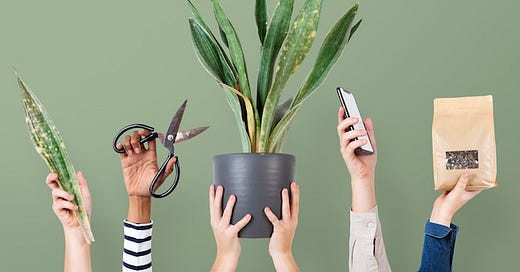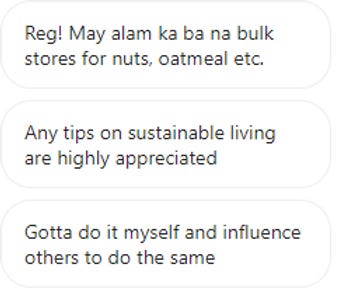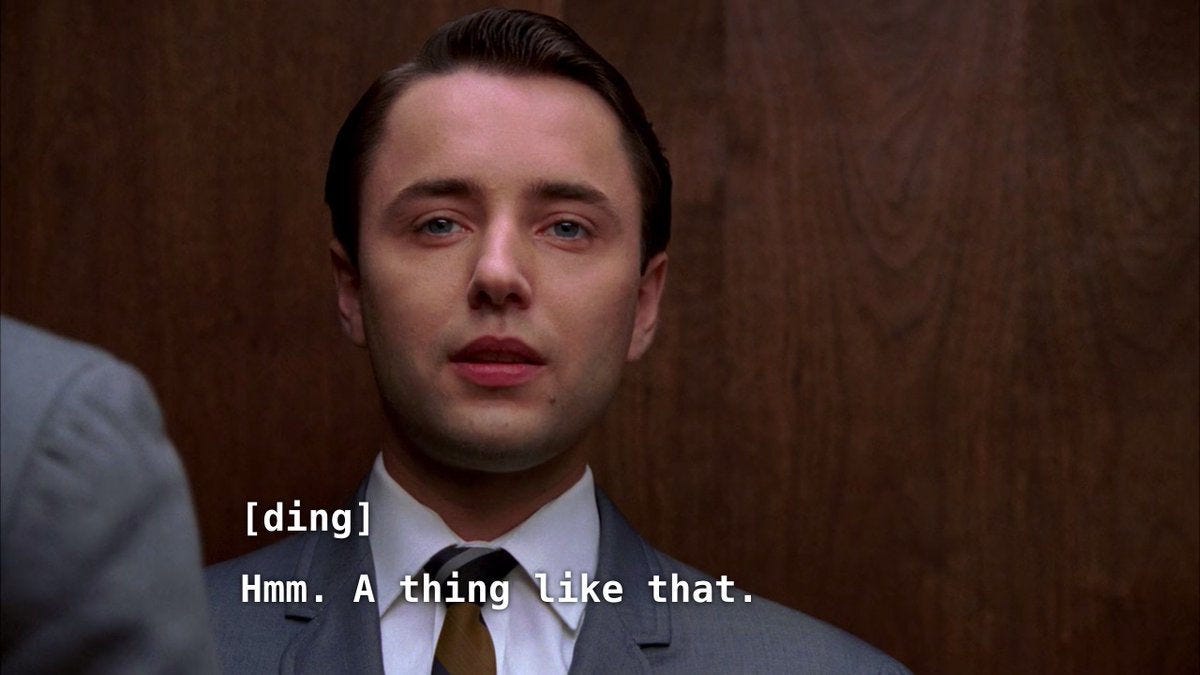Story Time: How I Became an Environmental Advocate (and How My Job as a Copywriter Helps Me)
And how I make peace with my capitalism-driven job in light of my advocacy
Whether you’re a copywriter, entrepreneur, advocate, or hobbyist, chances are you’ve been asked “So how did you get into _____?” It’s like the grown-up version of “What do you want to be when you grow up?”
Maybe you’ve asked others that question yourself! And that’s no surprise. It’s a great jumping-off point for learning more about the person you’re talking to, and it’s an opportunity to start talking about what makes you tick.
In my case, I’ve had a handful of people ask me about how I got into copywriting. But few people have asked me how I got into the whole sustainability, zero-waste, environment advocacy. I don’t know if it’s because, at this point, it’s strange if you aren’t eco-friendly in some way? Or is it because I don’t open myself up for that question? Either way, I really want to talk about it here, and I want to be able to have a nice little script or spiel for whenever that question does get thrown my way.
Eco-friendly habits I didn’t realize my family was already doing
Filipinos are known to be quite resourceful, and as the wasteful concepts of sachets, plastic bags, and processed food all pretty much come from the West, I think it’s no surprise that there were a couple of eco-friendly habits that my folks were already practicing, way before I could even spell the word environment.
Some of these include buying taho using a mug from home instead of the plastic cups the vendors bring with them and reusing plastic bags. My parents would have me and my sister draw on scratch paper from my mom’s office. My sister and I would get creative with powdered milk boxes, tissue paper rolls, and other kid-safe, recyclable items. Great for our creativity, and good for the planet.
Earth Hour (and why I don’t do it anymore)
The earliest memory I have of me consciously choosing to do something related to the environment was Earth Hour back in 2008. I had just graduated from elementary school, and Earth Hour fell on the night of my graduation ceremony. I think I first heard about it from my parents. Seeing as it was a nice way to cut back on electricity and be part of a movement, we sat in the dark for an hour.
We followed Earth Hour quite religiously for the next few years, up until I was in college. Then, I had an assignment for my creative writing class where I had to write a position paper. I’m not sure how or why, but I ended up picking Earth Hour and the environment as my topic. While doing my research, I read some articles that talked about how the effect of Earth Hour was negligible. Some even said that it could even be causing more of a negative impact on the planet - no thanks to people using candles as lights during this “blackout”, and the massive shutting down and starting up of generators.
Looking back, it was quite remarkable that my parents heard me out, and we stopped doing Earth Hour. I still see a lot of people posting about it every year, and tons of corporations milking the whole affair. I’ve read conflicting reports on how it can help or harm the planet, how it’s mostly symbolic, and so on. But for me, personally, I’ve decided to not follow Earth Hour anymore. Instead, I try to look for more impactful ways to help the planet, and I try to get my friends and family to do the same.
The turning point
Despite all those little habits and the paper I wrote, it wasn’t until a while later that my advocacy really “clicked” in my head. I think the turning point was when a batchmate of mine (hi Alli!) was posting a lot about skipping plastic straws. She was selling reusable straws and sharing videos on how marine life was affected by plastic. I bought those straws (I was still new to the advocacy and wasn’t aware yet of the whole “if you don’t need it, don’t buy it” philosophy) and gained more than just a reusable item - I gained knowledge about something that I believed more people should care about!
While that transaction was the turning point for me, it was joining the Buhay Zero-Waste Facebook group that had the most profound effect on how I looked at my lifestyle. How I saw my household’s practices. How I looked at society and the community - both in real life and online.
I switched to skincare products that didn’t come in plastic bottles. Thankfully, my skin was okay with it and I didn’t have to come running back to my derma. I brought reusable bags, a tumbler of water, and reusable utensils in whatever bag I was using. I learned to strike up the nerve to ask the barista for a “for here” mug, or to use the collapsible cup (this is a fancy purchase I don’t regret, since I’m already bad at packing light). My goal was to be able to afford bulk packaging for items like bathroom cleaner and dog food - easier on the budget in the long run, and there was less packaging. I tried looking for sellers that didn’t use that much packaging. I started a vegetable garden. I cajoled my parents into using produce bags and cloth laundry bags instead of the plastic labo used at the grocery and laundromat. Lastly, I started making ecobricks (a last resort when you’re trying to be zero-waste).
In short, joining the Buhay Zero-Waste group caused a snowball effect, and I still continue to learn from that group and from fellow advocates there.
What’s copywriting got to do with it (got to do with it)?
Well, for starters, I write about my journey on Instagram and Facebook. I post about my experiences when I try to shop plastic-free, when I make ecobricks, or when I putter around my vegetable garden that uses upcycled water gallons from a fellow Buhay Zero-Waste member. I get to write stuff outside of work, and I get to share my story with more people.
Next, I get to connect with fellow consumers and with brands - which is basically what I do as a copywriter, anyway. I know that brand owners and reps are listening, so I share my thoughts as a customer. This could be me praising stores like Loop for their eco-friendly efforts, or asking brands like Lazada and Shopee to switch to compostable packaging like Ranpak.
As for the consumers, I try to hijack “hot” or trending stuff, like the popular Home Buddies group on Facebook.
I used the popular Home Buddies Facebook group and the hashtags #Lazada77 #Shopee77 to get people to shop more responsibly.
Lastly, I team up with others to make a bigger impact. I was lucky enough to collaborate with International Coastal Cleanup (ICC) Philippines during my time at Vitalstrats Creative Solutions. Together, we came up with this video called “Single-Use Criminals.”
Despite all these efforts, though, it all boils down to the question: Does it make an impact?
I don’t know for sure.
I’m no Greta Thunberg, Anna Oposa, Joni Galeste, or Jammy (@darlingoftheorient on Instagram and TikTok).
I don’t have “friends in high places” who I can steer towards eco-friendly public policies.
But I do have family, friends, followers, and readers (like you!) who might something useful or interesting in the content I create.
And who knows? Some of you might start making small, sustainable changes at home.
Two of my highschool batchmates recently asked me how to live more sustainably. I like how this is becoming a more frequent occurrence!
Some of you might start taking these sustainable practices into your own small businesses, or you might be in a position to hold huge brands accountable for what they do to the planet.
My boyfriend just started a small coffee business and I told him about how other brewers have a “discount when you bring your own container” system.
And some of you might even have the ability to lead an entire community or country towards a greener future. Imagine that! A future where taking care of the planet is the norm, not the exception.
Whatever the case is for you, dear reader, I hope you’ll also find a way to make a positive impact on the environment. And the great news is, you choosing to read this article means you’re already off to a good start!
For tips on how to live a more eco-friendly life, join the Buhay Zero-Waste Facebook group (for Filipinos/those in the Philippines). Or, look for a zero-waste group in your community.
For more of my own zero-waste-related content (plus posts about my dog), check out my Instagram.
Want to learn more about how copywriting can help your advocacy? Shoot me a message today!











